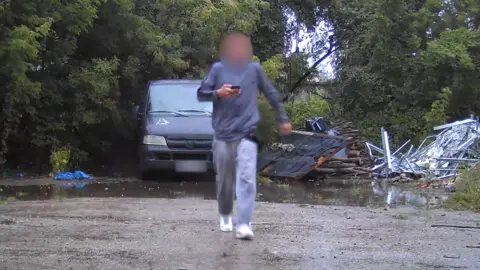Teenage Saboteurs in Ukraine: How Recruiters Target Vulnerable Youth Online
 SBU
SBUIn July this year a 17-year-old travelled 500 miles from his home in eastern Ukraine to collect a bomb and a phone hidden in a park in the western city of Rivne.
He claims he was promised $2,000 (£1,520) to plant the bomb in a van used by Ukraine's military conscription service.
Vlad, now 18, reflects on the moment he was preparing to connect the explosive device, expressing fear that it could detonate. His recruitment story sheds light on a growing issue where children and teens are targeted online, encouraged to commit acts of sabotage against their homeland.
The Security Service of Ukraine (SBU) reports that over the past two years, more than 800 Ukrainians have been identified as recruited by Russian handlers, with 240 minors involved, some as young as 11 years old.
Recruitment largely occurs on platforms like Telegram, often targeting the vulnerable seeking financial gain. With little understanding of the potential consequences, these recruits may carry out dangerous tasks, potentially risking their lives and, in some cases, losing them.
Andriy Nebytov of Ukraine's National Police highlighted the recruitment strategy as deliberately manipulative, targeting those who may not grasp the gravity of their actions. Children, he notes, can be convinced to build explosives from common household items, which are then planted in critical locations such as military recruitment offices.
Vlad’s recruitment process began when he well-intentionedly sought remote work opportunities on Telegram. Responding to a message from a recruiter, he quickly found himself embroiled in escalating threats that included sabotage and the planting of explosives.
Assessments by experts reveal disturbing patterns, with reports of even younger kids being approached by these recruits for illicit activities, often driven by desperation and misinformation.



















